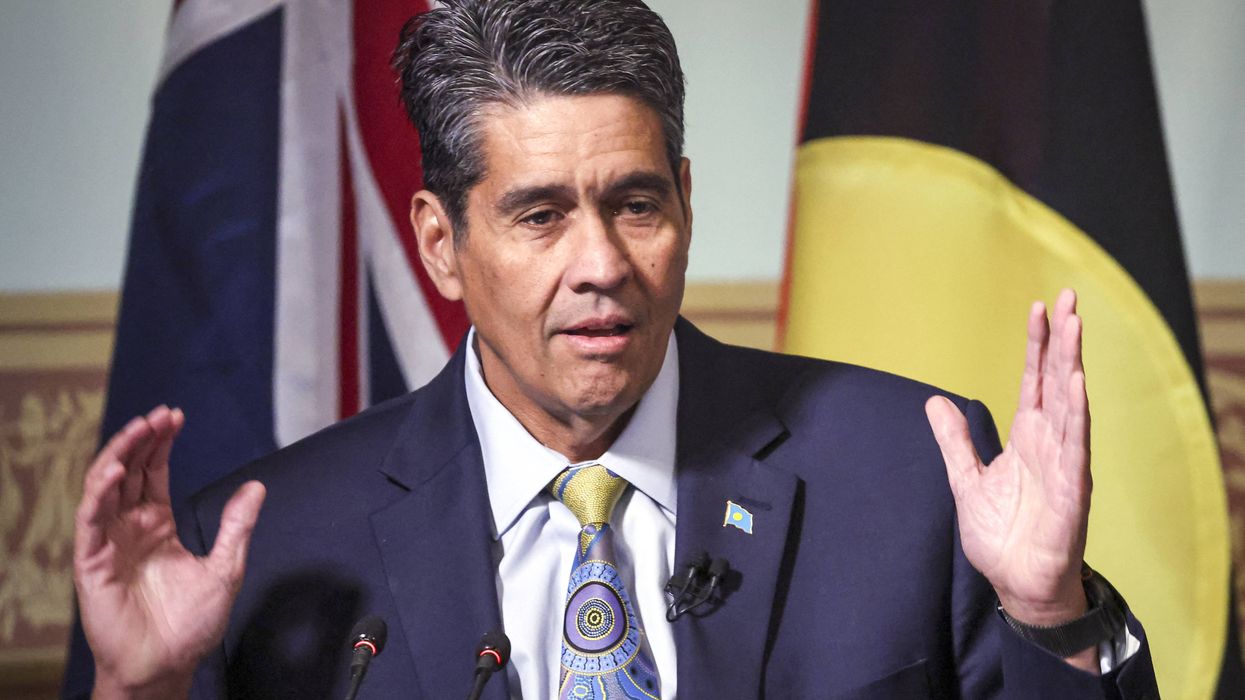April, 06 2016, 03:45pm EDT

For Immediate Release
Contact:
John Weisheit, Living Rivers and Colorado Riverkeeper, john@livingrivers.org
Lauren Wood, Green Riverkeeper, (801) 647-1540 lwood1988@gmail.com
Dr. Brian Moench, Utah Physicians for a Healthy Environment, (801) 243-9089
Anne Mariah Tapp, Grand Canyon Trust (928) 774-7488, atapp@grandcanyontrust.org
Rob Dubuc, Staff Attorney Western Resource Advocates (801) 487-9911, rob.dubuc@westernresources.org
Steve Bloch, Southern Utah Wilderness Alliance, (801) 428-3981, steve@suwa.org
Taylor McKinnon, Center for Biological Diversity, (801) 300-2414, tmckinnon@biologicaldiversity.org
Jake Thompson, Natural Resources Defense Council, (202) 289-2387, jthompson@nrdc.org
Ted Zukoski, EarthJustice, (303) 996-9622, tzukoski@earthjustice.org
Obama's Interior Department Pushes Oil Shale Plan Threatening Massive Climate Pollution, Water Use
SALT LAKE CITY, Utah
The Bureau of Land Management announced this week that it is moving toward allowing dirty oil shale development that could be a double whammy for the environment, unleashing nearly a half a billion tons of greenhouse gases and consuming vast amounts Colorado River basin water. It would be the first commercial oil shale production facility in the United States.
|
The Bureau said that on April 8 it will release a draft environmental impact statement for the "Enefit American Oil Utility Corridor Project." It would allow Enefit, an Estonian company, to build water, oil, gas and electric transmission across federal public land in Utah to enable oil shale mining on state on private land. Enefit hopes to process up to 1.2 billion barrels of kerogen oil -- one of world's most carbon-polluting fuels -- with estimated lifecycle greenhouse gas emissions of up to 450 million tons of carbon dioxide equivalent, about the same as 100 coal-fired power plants emit in a year.
"President Obama was right when he said in his State of the Union that 'we've got to accelerate the transition away from old, dirtier energy sources'," said Ted Zukoski, an attorney at Earthjustice. "It's time BLM got the memo and stopped wasting taxpayer money subsidizing companies that would foul our atmosphere and endanger our planet, and our future."
"The Interior Department is working against President Obama's climate goals here," said Taylor McKinnon with the Center for Biological Diversity. "Enabling the development of one of the world's dirtiest fossil fuels is the opposite of climate leadership. The administration should abandon this project now."
"We don't need to take on this environmental disaster that comes with developing the dirtiest fuel on the planet -- oil shale," said Rob Dubuc, senior staff attorney at Western Resource Advocates. "Renewable energy innovations and improvements in energy efficiency make this fuel unnecessary to develop. BLM should not advance this project."
The draft environmental impact study comes only months after the United States and countries around the world committed, at the Paris climate negotiations, to the goal of limiting global warming to 1.5 degrees Celsius above preindustrial levels. Reaching that goal will require dramatic reductions in carbon pollution -- the key driver of climate change -- and leaving the vast majority of fossil fuel reserves in the ground. Enefit's mining facility would expand development and use of one of the world's highest carbon fuels.
"There is more energy in a similarly sized baked potato than in a chunk of oil shale," said Steve Bloch, legal director for the Southern Utah Wilderness Alliance. "We know that burning oil shale in a giant oven can produce shale oil; the question that needs to be asked is whether proceeding with this type of project makes any sense in a carbon constrained 21st century. The unequivocal answer is no. The time has come to turn our backs on the carnival barker's promise that oil shale will be answer to our nation's energy needs."
"It is true that Enefit has made the mining and production of oil shale work for the energy needs of Estonia. However, Estonia also produces more greenhouse gas emissions per capita than other European countries, including Russia," said John Weisheit with Living Rivers and Colorado Riverkeeper. "What Estonia has, that Utah does not, is ample water supplies to process that oil shale. Ironically, the similarity between the governments of Utah and Estonia is their subsidy of dirty energy projects with public money."
The proposed facility will be located in the Uinta Basin, approximately 12 miles southeast of Bonanza in Uintah County, Utah, near the Green and White Rivers. The project is designed to develop oil shale mining and a shale oil production complex, at full build-out producing about 28 million tons of raw oil shale ore rock per day and 50,000 barrels per day of refinery-ready shale oil from the Green River Formation.
"Oil shale is a thirsty industry," said Anne Mariah Tapp with the Grand Canyon Trust. "The Colorado River Basin is already looking at up to a 27 percent decrease in April to July flows due to climate impacts. At a rate of up to four barrels of water per barrel of oil, Enefit's project poses an unacceptable threat to limited Colorado River Basin water supplies. Both in terms of carbon footprint and water demands, the West's water future would be drastically compromised by this oil shale program."
"The legacy of the Green River will live or die on the decisions we as a country make here and now," said Lauren Wood with Green Riverkeeper. "The Green River watershed cannot survive as a vibrant source of life in a desert if the BLM continues to view the landscape it runs through as a source of death and climate devastation. It's time to close this chapter of our shared history where we strayed into such extreme and dangerous forms of energy; that isn't our legacy, it's our nightmare."
"This oil shale project would be another significant source of pollution in an area that just can't take any more," said Dr. Brian Moench with Utah Physicians for a Healthy Environment. "During the drilling boom of 2013 the air pollution in the Uinta Basin was literally off the charts, as much as would be expected from 100 million cars, eight times more cars than in all of Los Angeles. It would be unconscionable to allow anything that would make that even worse."
"A century's worth of failed efforts has demonstrated that trying to turn rocks into oil is a fool's errand, but somehow Enefit expects a different result this time," said Bobby McEnaney, a senior analyst for the Natural Resources Defense Council. "The last thing this administration should be considering is a proposal that amount to fossil fuel alchemy, particularly when cleaner energy sources are readily available."
The Bureau of Land Management's webpage for the project is here.
At the Center for Biological Diversity, we believe that the welfare of human beings is deeply linked to nature — to the existence in our world of a vast diversity of wild animals and plants. Because diversity has intrinsic value, and because its loss impoverishes society, we work to secure a future for all species, great and small, hovering on the brink of extinction. We do so through science, law and creative media, with a focus on protecting the lands, waters and climate that species need to survive.
(520) 623-5252LATEST NEWS
'Unhinged' Trump Wishes 'Merry Christmas to All, Including the Radical Left Scum'
"Nothing more Christian than to be a hateful wretched fuck on Jesus’ birthday," quipped one critic.
Dec 25, 2025
In a message called typically on-brand by observers, US President Donald Trump wished "Merry Christmas to all"—including his political opponents, whom he described in decidedly unchristlike language.
"Merry Christmas to all, including the Radical Left Scum that is doing everything possible to destroy our Country, but are failing badly," Trump said Christmas Eve on his Truth Social network.
"We no longer have Open Borders, Men in Women’s Sports, Transgender for Everyone, or Weak Law Enforcement," the president added. "What we do have is a Record Stock Market and 401K’s, Lowest Crime numbers in decades, No Inflation, and yesterday, a 4.3 GDP, two points better than expected. Tariffs have given us Trillions of Dollars in Growth and Prosperity, and the strongest National Security we have ever had. We are respected again, perhaps like never before. God Bless America!!!"
While nothing new—Trump has used past Christmas messages to tell people he doesn't like to "go to hell" and "rot in hell"—observers, including some MAGA supporters, were still left shaking their heads.
"Radical Left Scum" 😂🤣😂🤣😂🤣Christmas greetings from a liar, traitor, pedophile, and overall shitstain upon society.
[image or embed]
— Bill Madden (@maddenifico.bsky.social) December 24, 2025 at 9:00 PM
"Nothing more Christian than to be a hateful wretched fuck on Jesus’ birthday!" liberal political commentator Dean Withers said on X.
Another popular X account posted: "A sitting president of the United States using Christmas Day to spew venom at fellow Americans he calls 'Radical Left Scum' isn’t just unpresidential—it’s unhinged, un-Christian, and utterly beneath the office."
"This is the behavior of a bitter, small man who can’t even pretend to unify for one holy day," she added. "Shameful. Disgraceful. Pathetic."
Keep ReadingShow Less
Palau Signs Controversial $7.5 Million Deal to Take 75 Trump Deportees
"What if we spent the $100,000 per person in America setting them up with housing assistance, healthcare, education, etc?" asked one critic.
Dec 25, 2025
Palau said Wednesday that it has agreed to take in up to 75 people deported from the United States during President Donald Trump's purge of unauthorized immigrants in exchange for millions of dollars in financial assistance—a move that has sparked considerable opposition among the Pacific archipelago nation's roughly 18,000 inhabitants.
The office of Palauan President Surangel Whipps Jr. announced a memorandum of understanding with the United States under which the country will receive $7.5 million in assistance in exchange for taking in 75 third-country deportees who cannot be repatriated to their countries of origin.
Earlier this week, US State Department Principal Deputy Spokesperson Tommy Pigott said the people who will be sent to Palau have “no known criminal histories," as is the case with the vast majority of unauthorized immigrants in the United States, who have committed no crime other than the mere misdemeanor of entering the country illegally.
However, Palauans have voiced concerns over US Secretary of State Marco Rubio's remarks during a Cabinet meeting earlier this year in which he said that, “We want to send some of the most despicable human beings—perverts, pedophiles, and child rapists—to your countries as a favor to us."
Whipps said Wednesday that the relocation plan involves “people seeking safety and stability."
“These are not criminals,” the president said during earlier debate on the proposal. “Their only offense was entering the United States illegally and working without proper permits.”
However, Palau's Congress and its influential Council of Chiefs have twice rejected the transfers.
Piggot's statement "highlighted US commitments to partner with Palau on strengthening the country’s healthcare infrastructure, increasing Palau’s capacity to combat transnational crime and drug trafficking, and bolstering Palau’s civil service pension system."
Palau, which was administered by the US from 1947-94 and is now associated with the United States under the 1994 Compact of Free Association, which guaranteed the country nearly $900 million economic aid over 20 years in exchange for exclusive US military access.
The country's foreign policy often tracks closely to that of the US. For example, Palau is sometimes among the handful of usually similarly small nations that vote along with the United States and Israel against United Nations resolutions condemning Israeli crimes or affirming Palestinian rights.
Other developing nations including Eswatini, Rwanda, South Sudan, and Uganda have also agreed to take in US deportees or are considering doing so.
Reactions to the US-Palau agreement drew criticism on social media, where one X user called the deal a "bribe" and another popular Bluesky account asked, "What if we spent the $100,000 per person in America setting them up with housing assistance, healthcare, education, etc?"
Keep ReadingShow Less
Trump 'Choosing From the War Crimes Menu' With 'Quarantine' on Venezuela Oil Exports
"Economic strangulation is warfare and civilians always pay the price," lamented CodePink.
Dec 25, 2025
President Donald Trump has ordered US military forces to further escalate their aggression against Venezuela by enforcing a "quarantine" on the South American nation's oil—by far its main export—in what one peace group called an attempted act of "economic strangulation."
"While military options still exist, the focus is to first use economic pressure by enforcing sanctions to reach the outcome the White House is looking [for]," a US official, who spoke on condition of anonymity, told Reuters.
The move follows the deployment of an armada of US warships and thousands of troops to the region, threats to invade Venezuela, oil tanker seizures off the Venezuelan coast, Trump's authorization of covert CIA action against the socialist government of Venezuelan President Nicolás Maduro, and airstrikes against boats allegedly running drugs in the Caribbean Sea and Pacific Ocean that have killed more than 100 people in what critics say are murders and likely war crimes.
This, atop existing economic sanctions that experts say have killed tens of thousands of Venezuelans since they were first imposed during the first Trump administration in 2017.
"The efforts so far have put tremendous pressure on Maduro, and the belief is that by late January, Venezuela will be facing an economic calamity unless it agrees to make significant concessions to the US," the official told Reuters.
The official's use of the word "quarantine" evoked the 1962 Cuban Missile Crisis, an existential standoff that occurred after the John F. Kennedy administration imposed a naval blockade around Cuba to prevent Soviet nuclear missiles from being deployed on the island, even as the US was surrounding the Soviet Union with nuclear weapons.
"This is an illegal blockade," the women-led peace group CodePink said in response to the Reuters report. "Calling it a 'quarantine' doesn’t change the reality. The US regime is using hunger as a weapon of war to force regime change in Venezuela. Economic strangulation is warfare and civilians always pay the price. The US is a regime of terror."
Critics have also compared Trump's aggression to the George W. Bush administration's buildup to the invasion and occupation of Iraq, initially referred to as Operation Iraqi Liberation (OIL). But unlike Bush, Trump—who derided Bush for not seizing Iraq's petroleum resources as spoils of war—has openly acknowledged his desire to take Venezuela's oil.
"Maybe we will sell it, maybe we will keep it,” he Trump said on Monday. “Maybe we’ll use it in the strategic reserves. We’re keeping the ships also.”
On Wednesday, a panel of United Nations experts said that the US blockade and boat strikes constitute "illegal armed aggression" against Venezuela.
Multiple efforts by US lawmakers—mostly Democrats, but also a handful of anti-war Republicans—to pass a war powers resolution blocking the Trump administration from bombing boats or attacking Venezuela have failed.
The blockade and vessel seizures have paralyzed Venezuela's oil exports. Ports are clogged with full tankers whose operators are fearful of entering international waters. Venezuela-bound tankers have also turned back for fear of seizure. Although Venezuelan military vessels are accompanying tankers, the escorts stop once the ships reach international waters.
According to the New York Times, Venezuela is considering putting armed troops aboard tankers bound for China, which, along with Russia, has pledged its support—but little more—for Caracas.
Keep ReadingShow Less
Most Popular



